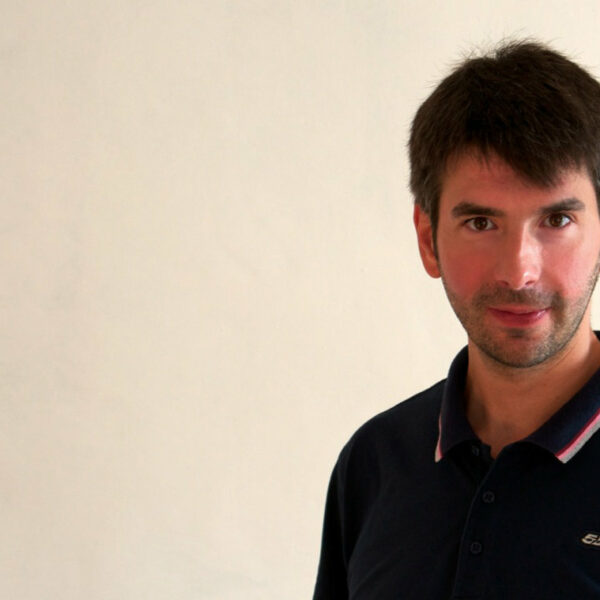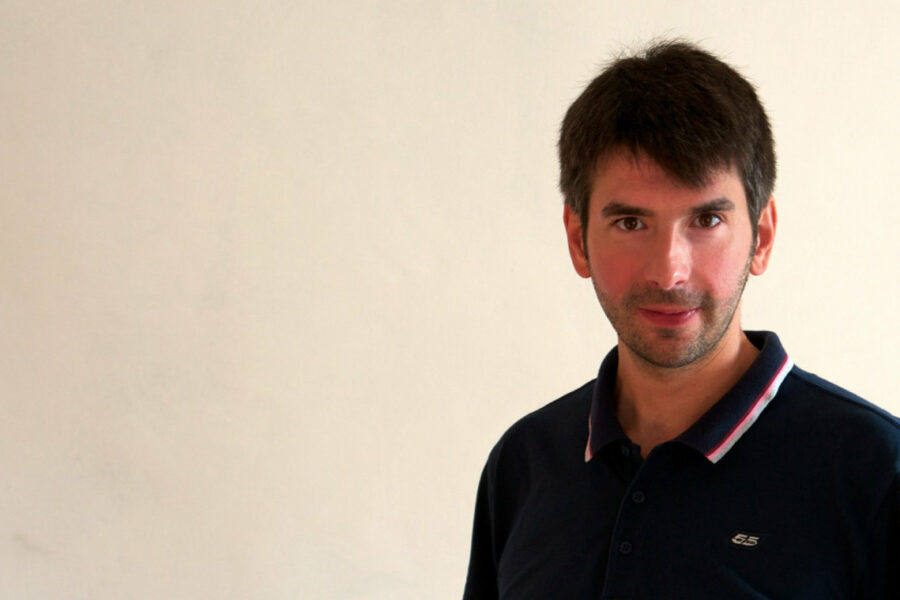- Name: Martin Crockett
- Company: Pirata London
- Job Title: Senior Project Manager / Producer
- Website: Martin Crockett.com
Martin Crockett currently works as a Senior Project Manager / Producer at Pirata London. His first computer was a Sinclair ZX81 with 1Kb of RAM and one of his most unusual work moments was finding himself in a job interview with the late Sex Pistols manager, Malcolm McLaren. Follow Martin on Twitter.
The Day Job
Tell me a little bit about the company you work for
I am currently employed on a 3-month fixed-term consultancy contract for a London-based digital production agency called Pirata London. It’s basically run by a trio of guys who were previously at Dare. It’s been in operation for just over two years.
I was hired to temporarily replace a leaving Digital Project Manager to cover two active projects for McLaren F1 and Coca-Cola Espana. It maintains a friendly, positive working environment and the standards are high.
What is the ratio of digital project managers to production staff at your company?
The ratio is of Digital Project Managers to production staff is approximately 1 to 5.
Do you use any particular project management methodologies? If so, why? If not, why?
I’m certified in both PRINCE2 and SCRUM project management methodologies. I use a hybrid of both methodologies depending on what the particular project demands are. I have a tendency to flex towards SCRUM for technical projects.
What online or offline tools do you tend to use for digital project management?
I’ve used a number of online tools but few really stand out as being noteworthy. One free tool for Agile project management I’ve had success using is Pivotal Tracker. There is also JIRA which is expensive but probably the best issue and project tracking tool.
I use Google Mail for email and Dropbox for file sharing. I recommend using a Wiki such as MediaWiki for project documentation.
Offline tools-wise, I use either Microsoft Project or a Mac-equivalent such as OmniProject or Merlin. However, this could be easily replaced with a spreadsheet for smaller projects.
For everything else, I (mis)use Open Office. It’s free and a credible alternative to Microsoft Office. I PDF everything as there’s no telling what it’ll look like on another system.
I have a preference for using a plain text editor for basic note taking, either TextMate on a Mac or Notepad++ on a PC. These are usually quicker than a Word or Writer word processing applications.
My main criteria of use is for speed, ease of use and low maintenance requirements.
How on earth did you end up managing digital projects? Few people start out with this aim. Tell me how you wound up being a full-time punch bag?
It’s a role I aspired to and was a natural progression. I have multiple skill sets of varying levels of ability across programming and visual design so found I could communicate well with individuals who also possessed similar skills.
A number of other Digital Project Managers I worked with at the time didn’t have a ‘hands on’ background so looked out of place when it came to motivating a team. Naturally, I felt I could do their job better and was looking for a new challenge.
I hit punch bags and other people in my spare time so I don’t get to be a punch bag!
Do you just manage digital projects or is your role varied? If so, what other roles do you perform?
Usually my role is varied. Sometimes this is through choice but sometimes simply through circumstances. In my last role before my current, I hand coded an administration interface using a combination of CSS and jQuery. Having active hands on skills still has its uses.
What type of digital projects do you typically work on?
My preference is towards technical ‘build’ projects, albeit web applications or multi-lingual websites with small, dedicated teams.
How many digital projects are you currently managing? What’s the most you’ve ever managed at any one time?
Currently, around four with different deltas of activity.
The most I’ve managed at one time was for Orange, the mobile network provider. I covered a colleague’s vacation time which was approximately fifteen to twenty concurrent digital marketing projects from emails to banners. There were multiple daily deliverables and it was all fast turnaround work.
What percentage of a digital project’s total budgeted hours would you typically spend on project management?
A ballpark would be 25% overall. Depending where I’m working, this is usually estimated as a percentage of the overall project or as individual hours.
What digital projects are you working on right now, and what digital project are you most proud of to date?
Currently the McLaren Formula 1 website and a promotional website for Coca-Cola Espana which is due to transition into a second phase shortly.
In current memory, I’m proud of the McLaren Formula 1 website and a web application I worked on for YouGov. The McLaren website I picked up late in the day and the majority of the work was complete but I inherited a passionate and highly skilled team who make it a pleasure to work on and develop further.
The YouGov web application I worked on from the first four iterations and had a similarly team. It’s since been growing since my tenure and you can expect to hear it referenced by the media in the run up to the upcoming general election.
Describe a typical day in the life of your role managing digital projects.
Morning: I typically make an informal check on my teams first thing to make sure things are running smoothly, then onto checking email. I batch process messages, use a few key labels to sort and archive, filter and clear as much as possible from my inbox, turning messages into next actions.
If a project requires a regular daily scheduled meeting then this would normally take place at a sensible time during the morning before too much work has been done. These take place if things are looking to going off track. Usually if things are okay, my team should be self-sufficient and able to progress without the need for interruption.
Lunch: I always take time out of the office to either spend time socialising with the team over good food or alone time to think about other things to clear my mind.
Afternoon: Usually I handle briefings, documentation and wrap up everything else.
How would you describe your managerial style?
I take my work seriously but myself lightly. I treat people like humans and I don’t suffer fools gladly.
What are the common things that crop up on a daily basis that destroy your planned activities for that day?
I would say nothing should destroy planned activities. Some critical issues may require a rapid response but overall if you’re working on digital projects these don’t involve life-threatening cases such as in the case of a lunar landing or heart surgery.
It’s important to keep a perspective and not to lose your head while others are busy losing theirs.
How do you keep organised personally, given the hectic life that comes with managing digital projects?
I’m naturally organised but always striving for improvement. I’m frugal and live minimally. Many of the concepts learnt in project management such as planning, budgets, actions, etc. also lend themselves to use in a personal lifestyle setting.
The Projects
At what point do you typically get involved with a digital project you are to manage? Pre-sales and estimating or only post-sale?
As early as possible.
The ‘red flag’ projects you come across are more often than not the ones that have commenced with no or incorrect digital project management. It’s usual that a Digital Project Manager gets involved at too late a stage where things are usually already starting to “go south”.
What technique do you use to estimate digital projects? Do you use different ones for small and large projects?
Experience cross-referenced with team sanity checks. Either using an Excel or Calc spreadsheet, Microsoft Project Gantt chart with resources mapped against the individual tasks or whatever I’m requires me to use. I use two types of spreadsheet for the estimating: one for hourly/daily detail, the other for days, weeks and months.
How do you handle unrealistic digital project budgets and schedules?
I would immediately flag this as an issue and escalate to the highest levels required to take a suitable action.
There are a number of other ways to handle unrealistic budgets and schedules but not all are feasible:
- De-scope the project
- Ask for more money
- Say it’s going to take longer than anticipated
- Re-negotiate budgets/timings
- Prioritise certain items to later phases
- Stop working until the issue is resolved
Not taking action is setting yourself up for a fall.
If you were the manager of a McDonald’s restaurant, you wouldn’t ask your staff to stay late and work for free, would you?
How does your company approach scheduling all the work currently in the pipeline?
For the basic scheduling nothing more than a simple Excel spreadsheet detailing resource allocation for the current and next months. My own project plans usually overlap this data with longer-term projections and task breakdowns.
You receive a new digital project to manage, what are the first steps you’ll take?
- Ask what the budget is. For me, this can be a conversation-ender if the budget is unrealistic
- Understand what the deliverables are
- Confirm delivery dates and dependencies on these
- Start to build a big picture of the issues, risks and various stakeholders involved
Do you manage all aspects of digital projects, like design, front-end and back-end development, or do department leads manage production based on requirements you capture?
A hybrid of the above. You need to have trustworthy, proactive department leads in place if you are going to let them have free reign with production.
What deliverables do you personally typically produce on a digital project? Sitemaps, wireframes, functional specifications? Or are these produced by someone else? If so, who?
There is variance from company to company and project to project. I’ve written briefs for copy and visual design, basic wireframes, support contracts, and functional specification documentation to support a project – it’s no problem for me.
Any task which is going to take more than a several hours of your time to achieve will need a dedicated resource.
What are all the things that will be defined and approved before design or development begins on one of your digital projects?
- A Statement of Work document: the who, why, what, how and when; also forming a legal contract
- User experience or interaction design documentation if it’s applicable to do so
- Confirmation of existing technology platforms and if these are applicable to the project
- Any existing digital brand guidelines. Most of the time these don’t exist or are inadequate
- A brief that holds everything together including detailed deliverables
- One thing that can help is to get 100% allocated design and development teams together to start discuss how everything is going to “work”. This can be a good barometer of how the teams may gel
- Start and end dates. You don’t want projects to run forever
How do you tackle the art of monitoring digital project budgets versus progress?
Simple mathematics.
I subtract expenses and third party costs against the budget. I then calculate the percentage complete from either my project plan or resource schedule and subtract this from the budget. So long as time is being tracked correctly, I usually have an accurate figure. Taking it a step further, I can calculate burn rate, profit/loss and more.
How do you manage the inevitable scope creep on digital projects?
A change request is written and approved with budget / time / impact estimates. If it’s an Agile project, new scope can usually be estimated and prioritised at the start of a new sprint but at the expense of lower priority items.
What advice would you give for managing difficult clients?
Difficult clients will ride your project off the tracks. You need to get them on board via using a friendly but disciplined approach – or suffer the consequences.
In my experience, some organisations will put the most inexperienced person possible in charge of your project so they have a scapegoat. They may not be knowingly difficult but will consistently fail to meet deadlines and get overruled by other figures more senior within their organisation. This is one situation you need to avoid as well.
How do you ensure past mistakes on digital projects never happen again?
By learning from experience. You need the ability to ‘put the handbrake on’ as soon as you sense something is starting to go astray.
The Big Questions
What websites, blogs and podcasts are you currently using regularly for inspiration?
I subscribe to under ten blogs, three forums, seven technology websites and some job listings within Google Reader. I don’t feel the need to follow many more – it’s already more than enough.
There’s a new guy I recently discovered called Max Klein. It’s a blog written by one smart guy who’s an entrepreneurial developer. The subject matter is refreshing and intelligently written – he doesn’t churn out blog posts.
I track a few podcasts via iTunes such as The Digg Reel, Diggnation and the 37Signals podcast. I keep this list restricted as I don’t have time to follow many more.
What are the biggest differences between managing website projects and web application projects?
In my experience, web application projects set out to achieve a certain goals, serve a particular purpose or have fundamental customer interactions so are easier to rationalise. Website projects often don’t have this keen focus.
What do you think are the key personality attributes required to be a good digital project manager?
A sense of humour, discipline, be trustworthy, be a good listener, have an eye for detail and not be challenged to assert your opinion.
What are the biggest common misconceptions about digital project management?
There is one. That both agency and client staff fail to see the value in it.
What, in your opinion, is the hardest part of digital project management?
Usually being confined to working within a traditional advertising agency model. Once you have account executives, account managers, account directors, planners, art directors, creative directors et al involved, your project has an exponential increase in budget and internal approvals.
Compared to other project management scenarios, within for example, construction, healthcare, etc. it requires specialist knowledge and tends to get made more complex by “too many cooks spoiling the broth”.
In three words, how would you describe digital project management?
Black Hawk Down.








One more question: Have you considered outsourcing or managed freelance programmers?
‘PDF’ is not a verb.
Thanks Sam for another great interview. I became a project manager at the start of this year, after previously being a web developer, and have found it really useful to have an insight into the work of other project managers from your articles.
One point of note is that Martin said Jira was good, but very expensive. The price for Jira now starts from $10 and it’s a great tool!
@Simon, really glad to hear you’re liking the series, the reason you like it is exactly the reason I started it – interesting stuff!
Black Hawk Down – brilliant!
@Cola, it is the best huh :)
Good Read,
I must say, the interview cleared all the doubts I’ve in my mind and also made me think to change the way i work or execute the project.
We in India, don’t use too much Project Management application and the process you’ve defined here, but i’ll definitely check out all the applications you’ve defined here.
Thanks Martin for such a Good Interview…
@Vicky, I think all the interviews have made me feel that way – if not that I should change how I do things, but that there are loads of people out there with the same daily challenges and pressures!